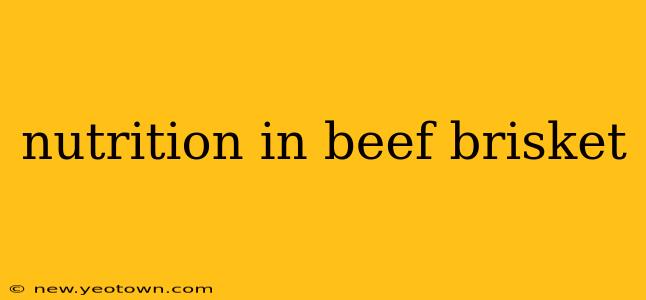The aroma of slow-cooked beef brisket, smoky and tender, is enough to make anyone's mouth water. But beyond its delicious taste, this cut of beef offers a surprising array of nutritional benefits. Let's delve into the world of brisket nutrition, exploring its protein content, vitamins, minerals, and potential health impacts. This isn't just about satisfying your cravings; it's about understanding the nutritional value of a culinary classic.
What are the nutritional benefits of beef brisket?
Beef brisket, like other cuts of beef, is a fantastic source of high-quality protein. Protein is crucial for building and repairing tissues, making it vital for muscle growth, immune function, and overall health. A 3-ounce serving of cooked beef brisket can provide roughly 20-25 grams of protein, contributing significantly to your daily protein intake.
Beyond protein, brisket contains essential minerals like iron and zinc. Iron is crucial for carrying oxygen throughout the body, preventing anemia, and supporting energy levels. Zinc plays a key role in immune function, wound healing, and cell growth. Brisket also provides smaller amounts of other vital minerals, including selenium and phosphorus.
While not as rich in vitamins as some fruits and vegetables, brisket does offer some B vitamins, particularly niacin and riboflavin. These B vitamins are essential for energy metabolism and maintaining a healthy nervous system.
How much protein is in beef brisket?
As mentioned before, a 3-ounce serving of cooked beef brisket generally contains 20-25 grams of protein. This amount can vary slightly depending on the preparation method and the specific cut of brisket. However, it consistently provides a substantial contribution to your daily protein needs, making it a popular choice for athletes, bodybuilders, and anyone looking to increase their protein intake.
Is beef brisket good for weight loss?
This is a more nuanced question. Beef brisket, like any high-protein food, can be part of a healthy weight-loss diet. The high protein content promotes satiety, meaning it keeps you feeling full for longer, potentially reducing overall calorie intake. However, the calorie and fat content of brisket should be considered. Choosing leaner cuts, trimming visible fat, and incorporating brisket into a balanced diet with plenty of fruits, vegetables, and whole grains are crucial for successful weight management. Portion control is key.
Is beef brisket healthy?
The healthfulness of beef brisket depends on several factors: the cut, the cooking method, and the overall diet. While it's a good source of protein and essential minerals, it's also relatively high in saturated fat. Excessive saturated fat intake is linked to an increased risk of heart disease. Therefore, moderation is key. Choosing leaner cuts, trimming excess fat, and opting for healthier cooking methods like grilling or baking instead of frying can help minimize the negative impact of saturated fat. Including brisket as part of a balanced and varied diet, rather than making it a staple, is the healthiest approach.
What are the downsides of eating beef brisket?
The main downside of eating beef brisket is its relatively high saturated fat content. Consuming too much saturated fat can contribute to high cholesterol levels, increasing the risk of heart disease. Additionally, depending on the preparation method, brisket can be high in sodium, which can be problematic for individuals with hypertension or other health conditions. Therefore, mindful consumption and attention to preparation methods are vital.
Conclusion: Enjoying Brisket Responsibly
Beef brisket, when enjoyed in moderation and as part of a balanced diet, offers significant nutritional benefits, primarily its high-quality protein and essential minerals. However, its saturated fat content necessitates mindful consumption. By choosing leaner cuts, trimming fat, selecting healthy cooking methods, and paying attention to portion sizes, you can enjoy the delicious taste of brisket while minimizing potential health risks. It’s all about balance and informed choices.

